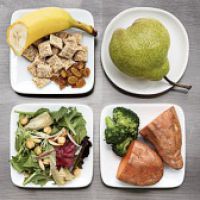Do You Have Enough Fiber In Your Diet?
Adequate fiber intake is linked to a lower risk of disease. Unfortunately, most Americans eat far less than the recommended amount. The Institute of Medicine recommends 14 grams of fiber for every 1000 calories ingested each day. This translates to a daily intake for men and women < age 50 of 38 and 25 grams respectively per day while for men and women > age 50 it is 30 and 21 grams per day respectively due to decreased food consumption.
Why is fiber good for us? There are so many potential benefits of fiber--from lowering blood cholesterol levels, and protecting against Cardiovascular Disease to improving and preventing constipation, and maintaining weight. Fiber is particularly beneficial to seniors as has been shown to both keep blood pressure under control reduce the risk of Type 2 diabetes.
Adding fiber to your diet isn't as hard as it may seem. It can be as easy as choosing nutrient rich foods such as fresh fruits and vegetables, whole grains and beens over processed foods and sodas.
So how are you going to get more fiber in your diet? Here are a few ways to do it
1. Eat more veggies.
- 1 cup cauliflower cooked =3 grams
- 1 cup cooked broccoli=4.5 grams
- 1 sweet potato=4 gram
2. Eat more fruits.
- 1 cup strawberries=4 grams
- 1 banana=3grams
- 1 pear=5 grams
3. Enjoy your beans. They have more fiber than most foods and contain lots of protein.
- 1 half cup beans=6.2 grams
- 1 bean burrito=8 gram
4. Choose whole grains. In addition to fiber they are full of nutrients, vitamin B, antioxidants and proteins.
- 1 cup brown rice=4grams
- 2 slices whole wheat bread=4 grams
5. If you eat cereal for breakfast--go for the high fiber ones.
- 1 half cup Fiber One=14 grams
- 1 cup Raisin Bran=7.5 grams
- 1 half cup Kashi Summer Berry Granola=7 grams
Want to learn how much fiber you should be getting each day? Here's a great tool to measure the daily amount of fiber and other nutrients that you should be eating every day.

